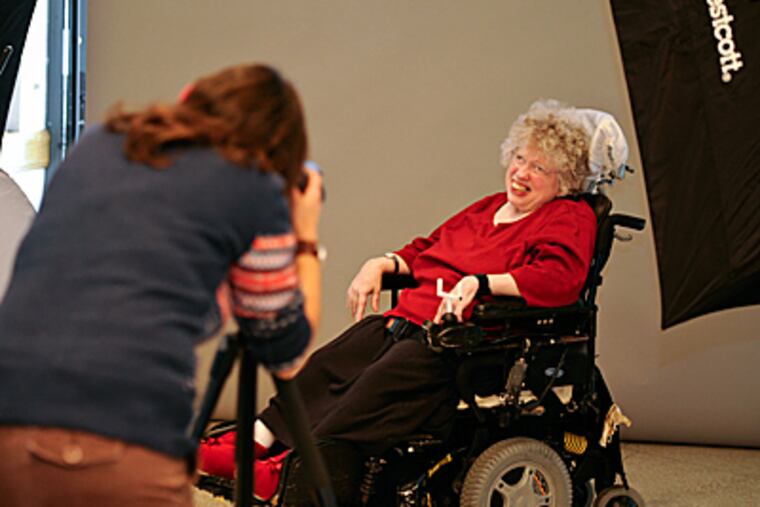Photographers give portraits to those who seldom get one
The smiles were extraordinary. They outshone even the flashing cameras of a dozen volunteer photographers who on Saturday turned Inglis House into a giant studio - offering the severely disabled a holiday gift: the simple dignity of a formal portrait.

The smiles were extraordinary.
They outshone even the flashing cameras of a dozen volunteer photographers who on Saturday turned Inglis House into a giant studio - offering the severely disabled a holiday gift: the simple dignity of a formal portrait.
"It was my first time getting my picture taken," said Shadia Dixon, 22, struggling to speak from her wheelchair.
The shoot at the Philadelphia long-term-care facility was part of Help-Portrait, a national project whose concept is both elegant and powerful: Photographers lend their talent to take portraits of people in need - homeless men, single mothers, Army vets, sick kids, the poor, the disabled, the old and the lonely - and then give them the framed picture.
No money changes hands.
The idea is to use photography to affirm the worth of every individual, whatever his or her circumstance, and particularly those who may not have had a picture taken in ages. Saturday, shoots took place at 570 locations in 56 countries and in all 50 states.
Inglis House, in the Wynnefield section, was one of four Help-Portrait sites in Philadelphia. Shooters began setting up at 9:30 a.m., and by 11 a line of wheelchairs stretched out the door of Founder's Hall. People unable to leave their beds were photographed in their rooms.
"I wanted a portrait," said Gina Minter, 62, who figured it had been six years since someone took her picture. "I wanted to share it with friends of mine on the outside."
Minter has lived at Inglis House since age 25. Cerebral palsy claimed her ability to walk and reduced her movement and ease of speaking. She said she doesn't dwell on it. She's determined to help others, "people who are less fortunate than me," by leading hospital visits and philanthropic efforts.
She dressed in a bright red blouse and black skirt for her portrait, positioning her motorized wheelchair before the camera lights. She offered a smile as bright as the season.
"I saw a lot of joy in her," said photographer Lauren Pupillo, 29, drawing back from her lens. "I see a contentment."
Inglis House serves 300 adults disabled by multiple sclerosis, spinal cord injuries, and other conditions. Many are unable to feed or dress themselves, but remain mentally alert, pursuing education and activities.
The house traces its roots to post-Civil War Philadelphia - and a girl who was disabled by scarlet fever at age 2. As she grew, Annie Inglis had the idea to start a home for poor people with disabilities, unusual in an age when the destitute depended on charity. Shortly before she died at age 18 in 1875, Annie gave her mother a $1 gold coin, to be auctioned to start a fund-raising campaign. Inglis House opened in 1877.
"One of the things that happens when you become disabled is a lot of normalcy gets stripped away from your life," said Inglis House chief executive officer Gavin Kerr. "Going for a portrait is something normal."
Some residents chose a gray or blue background. Others posed by a giant Christmas tree. Some wanted a picture with a staff member. The last time she sat for a photo, one woman recalled, was the day she came to Inglis House - the small head shot snapped for her ID card. On Saturday, everyone left Founder's Hall holding gorgeous 5-by-7 shots.
"I can give it to one of my family," said Maria Johnson, 44, as she maneuvered her wheelchair.
Since it began in 2009, Help-Portrait has fast become a regular, worldwide event, held on the second Saturday in December. It was founded by celebrity shooter Jeremy Cowart, photographer to entertainers such as Taylor Swift, Sting, and Carrie Underwood. He's enlisted more than 10,000 pro and amateur shooters, who have given more than 100,000 pictures.
Philadelphia photographer Jaleel King brought Help-Portrait to Inglis House.
"People don't understand the power a photograph can bring," he said. "Not so much 'I was here,' but, 'I was happy. For this moment, I was happy.' "
King, 36, knows those moments can be brief. In July 1984, at age 8, he was outside playing with firecrackers at the Tasker Homes when a man emerged with a shotgun.
"If you want to hear something loud, listen to this," the man said.
King woke up in the hospital, paralyzed from the waist down. As a teenager, he lived at Inglis House for a year. Now he runs his own photography business, shooting weddings, portraits, and city scenes from his wheelchair.
"Some of the people I know and loved, and were great to me, they died at Inglis House," he said. So it was important to offer people there a record of this moment.
"It means so much for somebody else," King said. "It was something I can give to myself - and get something back on a different level."